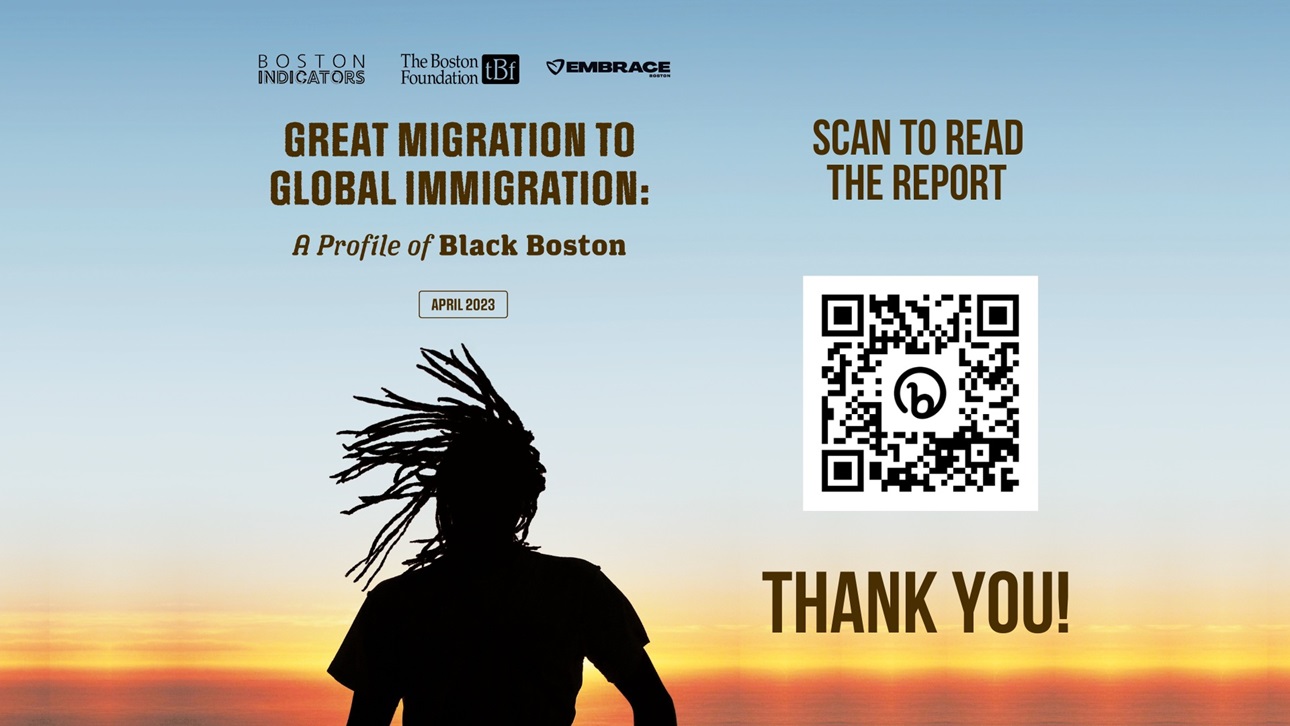Global Greater Boston: Immigrants in a Changing Region
February 14, 2024
A full house at the Roxbury Community College Media Arts Center auditorium explored nuances of a report co-authored by Boston Indicators researchers Peter Ciurczak and Luc Schuster and Tufts Professor Emeritus James Jennings. The event’s speakers, presenters, panelists, and audience circled themes captured in the report, Great Migration to Global Immigration: A Profile of Black Boston. For many, the report’s findings quantified what they had observed anecdotally and offered a platform to share thoughts on the fine balance between identity and unity.
Boston Foundation President and CEO Lee Pelton opened the formal proceedings, after a buzzy reception where social justice advocates, philanthropists, nonprofit professionals, researchers, students and other thinkers connected and reconnected. Pelton began with a reflection on the late Mel King, whom he called one of Boston’s most influential 20th century civic leaders. He urged the audience to take inspiration from King’s “other-centeredness.” Bringing King into the room was on point, as Roxbury Community College Interim President Jackie Jenkins-Scott took the podium next and credited King and his cohort of activists for getting RCC off the ground—and she invited all to participate in this year’s 50th anniversary celebrations, before handing the mic to the research presenters.
Luc Schuster from Boston Indicators and researcher James Jennings offered key points from the report, tracking demographic trends in Boston and Greater Boston from 1900 to today. For instance, in 1980, 75 percent of the region’s Black population lived in Boston proper. In 2020, almost 66 percent lived outside the city limits. Besides location, the report looked at income and at wealth in the form of homeownership or business ownership, and at subpopulations of ethnicity or nationality within the larger population.
Jennings presented these subpopulation dynamics that make Greater Boston’s Black population the most diverse in the nation. And he shared some of the knotty questions that naturally flow from the report, such as: How can this report serve as a tool to create equity-seeking strategies without sowing division? Is the term African American broadly applicable in Boston? Are there new political issues Black leaders must contend with, given today’s dramatic diversity?
Such questions set the stage for a good conversation, moderated by Elizabeth Tiblanc of Embrace Boston.
As to how to use the report, United Way of Mass Bay and Merrimack Valley’s Ansin President and CEO Bob Giannino said, “The old United Way would have taken this report and figured we had all the info and go about our business. But the questions make us realize there’s more we need to explore. We need to change the way we act as organizations, especially in philanthropy. We need to get closer to the communities whose images of success we aim to support…. We can best utilize this tool to tease out commonalities in terms of assets and experiences as well as the opportunities that lie ahead for all.”
Former Boston Acting Mayor and EMpath President and CEO Kim Janey took that farther, emphasizing the importance of story-telling. “There is a sentiment that foreign-born Blacks are taking jobs and opportunities away from African Americans,” she said, with some murmured affirmation from the audience. “But if we look closely there are many more connections and similarities that should bring people together rather than tear the community apart.” Baker Center President and CEO Bob Franks too urged looking beyond the flat data, saying, “There are people behind the numbers. We can talk about low rates of housing security, but what does that mean for a child in a family where there are concerns about housing, or for families displaced after generations?”
Jennings was first to agree the data need backing up with qualitative information. “Hard data is quite limited,” he said. “We need more storytelling about experiences because stories give us insight into how the numbers play out. The focus on understanding experiences is essential.” As for using that deeper understanding to promote unity across the population’s diversity, he cautioned that “the interests that are promoting division are maintaining the systemic inequities that are in place.” The report can help us navigate that, as it offers an opportunity to think about and define what is the Black population today. Bringing it full circle, he said, “Like Mel King said, ‘If they name you, they can claim you.’ This is our demographic opportunity.”
Agenda and Panelists
Welcome
M. Lee Pelton, President & CEO, The Boston Foundation
Opening Remarks
Jackie Jenkins-Scott, Interim President, Roxbury Community College
Presentation of Research Findings
Luc Schuster, Executive Director, Boston Indicators
James Jennings, PhD, Professor Emeritus, Urban & Environmental Policy & Planning, Tufts University
Panel Discussion and Audience Q&A
Robert P. Franks, PhD, President & CEO, The Baker Center for Children & Families
Robert Giannino, Ansin President & CEO, United Way of Massachusetts Bay & Merrimack Valley
Kim Janey, President & CEO, EMPath; Former Acting Mayor & Councilor, City of Boston
James Jennings, PhD, Professor Emeritus, Urban & Environmental Policy & Planning, Tufts University
Elizabeth Tiblanc, Vice President, Programs, Embrace Boston (Moderator)

